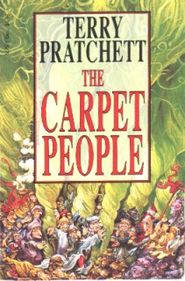- The Carpet People
-
The Carpet People
The Carpet People 1992 editionAuthor(s) Terry Pratchett Original title The Carpet People Country UK Language English Series none Genre(s) Fantasy Publisher Colin Smythe Publication date 1971,1992 Pages 199 ISBN 978-0919366145 The Carpet People is a fantasy novel by Terry Pratchett which was originally published in 1971, but was later re-written by the author when his work became more widespread and well-known. In the Author's Note of the revised edition, published in 1992, Terry Pratchett wrote: "This book had two authors, and they were both the same person."
The Carpet People contains much of the humour and some of the concepts which later became a major part of the Discworld series, as well as parodies of everyday objects from our world. Before creating the Discworld, Terry Pratchett wrote about two different flat worlds, first in this novel, and then in the novel Strata.
Contents
Plot summary
The story follows the journey of a tribe called the Munrungs, across a world known as the Carpet. Its resemblance to carpets does not end there; instead of trees, the landscape is a forest of hairs, and is littered with large grains of dust and vegetation. The sky is only referred to as above and below the surface is underlay, riddled with caves, and ultimately the Floor.
The Munrungs cross the carpet to find a new home after their village is destroyed by the powerful and mysterious natural force Fray. The origins of Fray are never explained in the book, but it is described in a way to suggest sweeping or vacuuming (some reviewers have suggested it represents human footfalls),[1] and is referred to as sweeping on the back cover of the current UK edition.
The tribe is led by Glurk, who is advised by Pismire, a philosopher and the tribal Shaman. Glurk's younger brother Snibril, however, is the book's protagonist, and is described by Pismire as having the kind of enquiring mind which is "dangerous". Snibril also has the unique ability to detect Fray a few minutes before it strikes - this ability manifests itself as an extremely painful migraine.
The only source of metal on the carpet is mined from a dropped penny; wood is taken from discarded matchsticks, while the clairvoyant Wights obtain varnish by scraping it from a chair leg (the chair leg is known to the Carpet People as "Achairleg").
The story ends following an epic battle against the Mouls - a race of Fray-worshipping creatures. At this point Snibril makes the decision to leave the tribe and to explore the furthest reaches of the carpet.
Themes
The book has been described as 'The Lord of the Rings on a Rug'. It explores the conflict between traditions and innovation. There is an established civilisation, complete with bureaucrats, taxes imposed and collected, and permits; there are people who resent the establishment; there is a need for both groups to find common ground in order to save their collective civilization.
One Munrung is afflicted with sinus problems, a normally unpleasant situation but which proves fortuitous to this story's successful conclusion.
Continuity
Terry Pratchett's novel Eric mentions that the president of the cabinet of demons has carpets inhabited by tribes of liliputs, possibly suggesting a link between The Carpet People and Discworld universes, or possibly merely one of Pratchett's in-jokes.
References
- ^ http://amazon.co.uk/Carpet-People-Terry-Pratchett/dp/0552551058 Amazon.com UK customer reviews, accessed 17 August 2009
External links
Categories:- 1971 novels
- 1992 novels
- Novels by Terry Pratchett
- Fantasy novels
- Fantasy worlds
Wikimedia Foundation. 2010.

